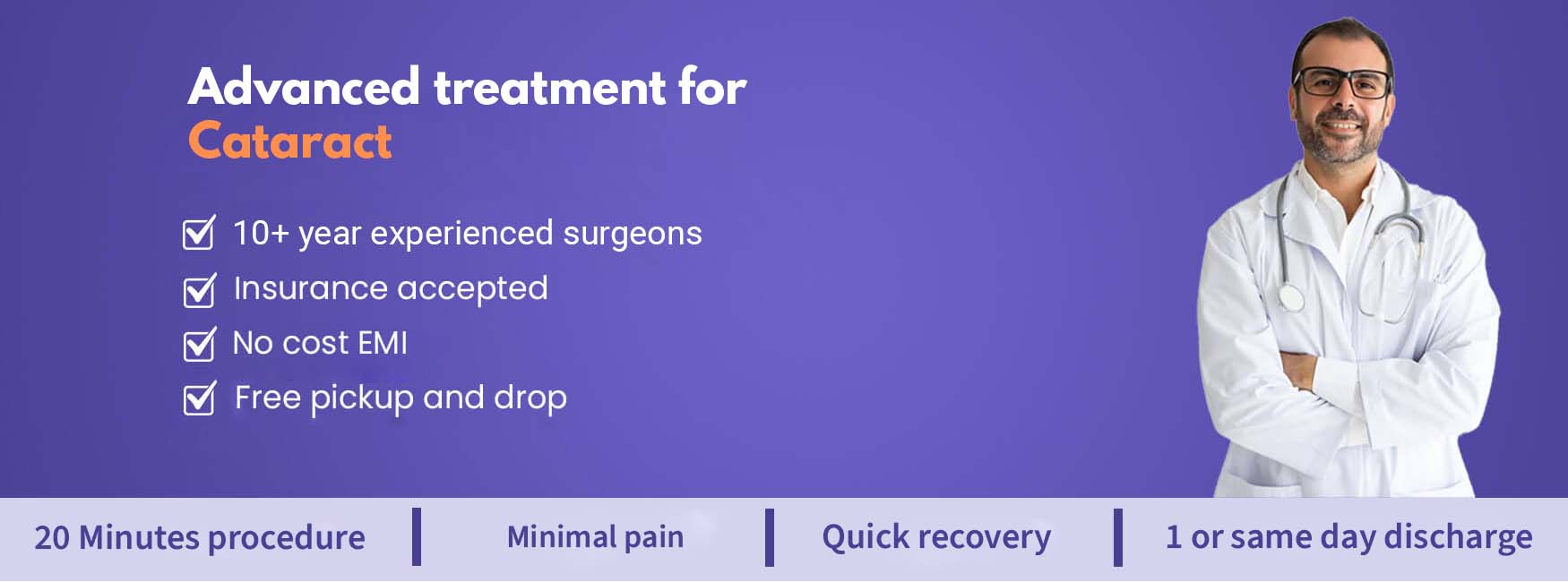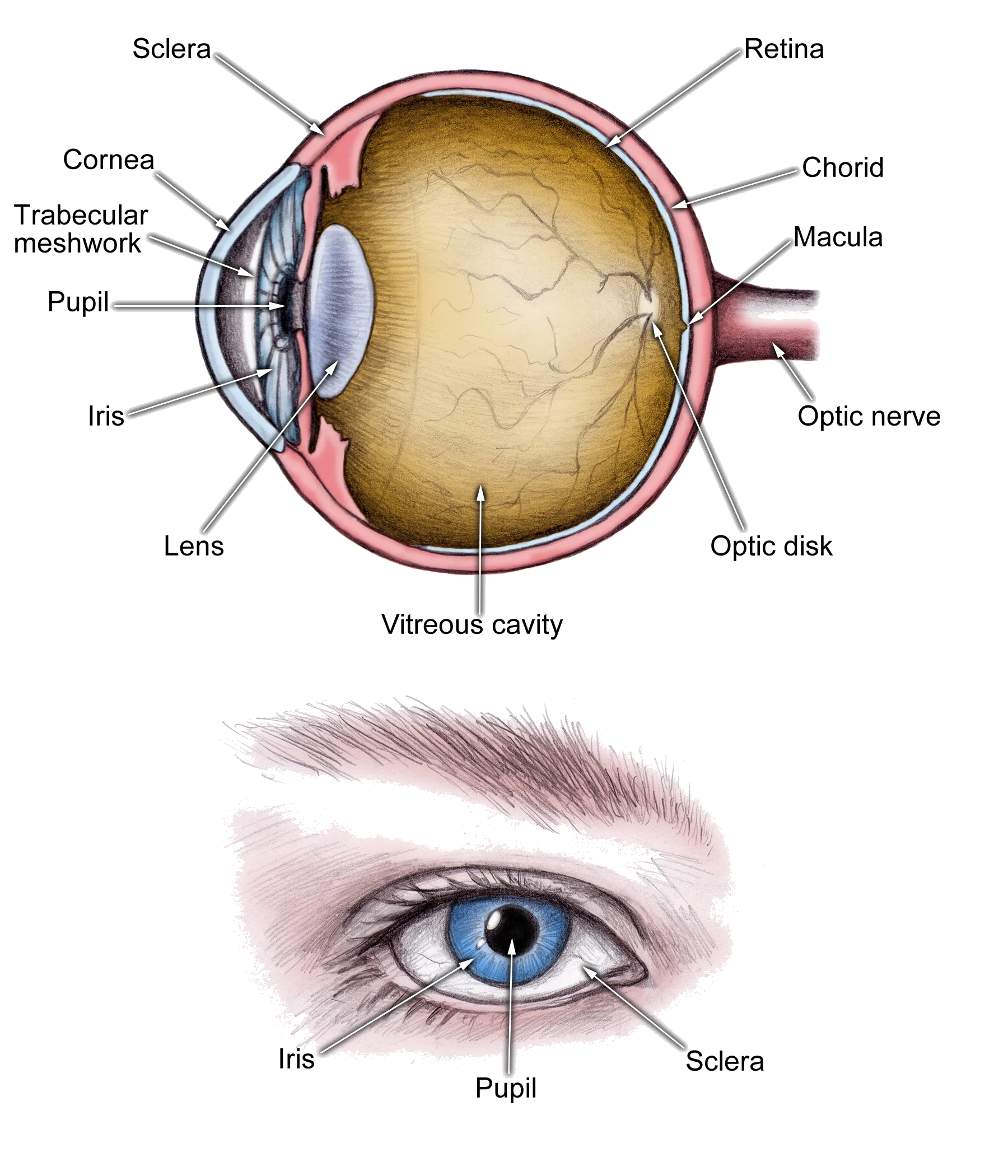

A cataract is a clouding of the eye lens and is very common as you grow older. Eye lens are positioned behind the colored part of your eye (iris). These lens with age, become less flexible, less transparent and thicker. As fibers within the lenses break down and clump together, the lenses cloud and your vision gets blurred. Cataracts generally develop in both eyes, but not always at the same rate. Most cataracts develop slowly but with time, cataracts will eventually interfere with your vision making it blurry, hazy, and one has trouble reading or doing other everyday activities.
At first, stronger lighting, eyeglasses and magnifying lenses for reading and other activities can help you deal with cataracts. But in time you might need cataract surgery. Fortunately, cataract surgery is generally a safe, effective procedure to correctproblems caused by cataracts.
Clouded, blurred or dim vision
Colors look faded
Need for brighter light for reading and other activities
Seeing "halos" around lights
Frequent changes in eyeglass or contact lens prescription
Fading or yellowing of colors
Double vision in a single eye
You have to change the prescription for your glasses often.
These symptoms can be a sign of other eye problems, too. Be sure to make an appointment for eye examination at FirstCure Health if you have any changes in your vision, such as double vision or flashes of light, sudden eye pain or sudden headache. Over time, cataracts can lead to vision loss.
There are 5 main types of cataracts but no matter what type of cataract you have, the treatment is always surgery.
Age-related cataract - The most common type of cataract is age related and develops because of natural changes in the lens of your eye. These form if you:
Smoke
Drink too much alcohol
Have a family history of cataract
Have diabetes
Have had certain eye surgeries, like glaucoma surgery
Take steroids (medicines used to treat a variety of health problems, like arthritis or allergies) for a long time.
Traumatic cataract - This cataract forms after an eye injury or it could form many years later.
Radiation cataract - Certain types of radiation like ultraviolet (UV) rays from the sun and radiation treatment for cancer can cause cataracts.
Pediatric cataract - Children can be born with cataracts (congenital cataracts) which are usually genetic — they run in families, or due to eye injuries, radiation, or steroid medications. It’s important to treat these cataracts early on so your child doesn’t develop other vision problems, like amblyopia (lazy eye).
Secondary cataract (posterior capsule opacification) - After cataract surgery, some people may develop a condition called secondary cataract that makes their vision cloudy again. Secondary cataract is common, but it’s easy to fix with a laser treatment.
Have regular eye examinations. Get a dilated eye exam if you’re 60 years old or older, get a dilated eye exam at least once every 2 years as this can help detect cataracts and other eye problems at their earliest stages. Ask your doctor how often you should have an eye examination.
Quit smoking. Ask for suggestions about how to stop smoking at FirstCure Health, we can offer medications, counseling and other strategies to help you.
Protect your eyes. You can take steps to protect your eyes from Ultraviolet light from the sun by wearing sunglasses and a hat with a brim to block the sun.
Eat Healthy. Eat plenty of fruits and vegetables — especially dark, leafy greens like spinach, kale, and collard greens. Fruits and vegetables have many antioxidants, which help maintain the health of your eyes.
Manage other health problems. Follow your treatment plan if you have diabetes or other medical conditions that can increase your risk of cataracts.
Reduce alcohol use. Excessive alcohol use can increase the risk of cataracts.
Surgery is the only way to get rid of a cataract if your cataracts start getting in the way of everyday activities like reading, driving or watching TV. During cataract surgery, the doctor removes the clouded lens and replaces it with a new, artificial lens (also called an intraocular lens, or IOL). This surgery is very safe, and people who get it can see better afterwards.
Sometimes, your doctor might recommend cataract surgery even if your cataracts aren’t the main cause of your vision problems. For example, if you have another eye condition, like diabetic retinopathy or age-related macular degeneration (AMD), your doctor will need to see the back of your eye to help you manage it.
Preparing for cataract surgeryInitially, your doctor will do some tests to measure the size and shape of your eye. Some special eye drops may be given before the surgery, and your doctor may tell you not to eat anything the night before your surgery. You won’t be able to drive yourself home after the surgery and you’ll need someone to make sure you get home safely.
If you have cataracts in both eyes, you’ll need to have surgery on each eye at a separate time, usually about 4 weeks apart.
Cataract surgeryThe cloudy lens will be removed from your eye and replaced with an artificial lens (called an intraocular lens). The process usually lasts about 1 hour and is almost painless. Usually, you will be awake during cataract surgery and can notice lights or motion, but won’t be able to see what your doctor is doing.
During this surgery, your doctor will:
Put numbing drops into your eye to keep you from feeling anything
Use tiny tools to cut into your eye, break up the lens and take it out
Place the new artificial lens in your eye
Right after surgery, you will need to rest in a recovery area outside the operating room for a little while. Before you go home, our medical team will check to ensure you don’t have any problems with your eye.
After cataract surgeryYour doctor will explain how to protect your eye after cataract surgery. Eye drops will be given for healing and you may need to wear glasses. You may be asked to avoid some activities for a few weeks, like touching your eye, bending over or lifting heavy things. Your eye may feel a bit itchy or uncomfortable and sensitive to light and touch. After 1 or 2 days, your eye should feel better. Your doctor will schedule checkups to make sure your eye is healing correctly.
We understand that a surgery need can be stressful that’s why we want you to focus only on getting better and leave everything else to us. We simplify your surgery experience by bringing together:
 1
1
We have some of the best surgeons who are highly reputed, skilled with most modern procedures and have atleast 10 years of experience. You can be rest assured of being in safe hands at all times.
 2
2
We use the most advanced surgical procedures like laser, laparascopic and other minimal invasive procedures to ensure most convenient treatments, faster recovery and best results.
Our services are reasonably priced to make them accessible to the masses. We offer multiple payment options, no cost EMIs, discounted diagnostics tests while supporting a wide range of insurance policies.
 4
4
FirstCure Assistant will assist you at every step from booking consultations, second opinions, arranging diagnostic tests, insurance approvals and related paperwork, admission to discharge and post-surgery follow-up consultation.
At FirstCure, our mission is to make your recovery process as simple, safe, care-filled and affordable as possible. Here’s how:
As each ailment requires a unique approach, get the right guidance from expert doctors and diagnostics to determine the surgical treatment.
Choose one of the FirstCure network hospitals and package curated for every budget and the day of surgery.
The access to advanced technology and doctor’s with in-depth surgical experience will ensure a fast recovery. Make use of our post-surgery free consultations for greater satisfaction for a smooth transition to your routines.






To schedule an appointment, you can either call us or send us an email at info@firstcurehealth.com. Our team will assist you in scheduling an appointment with one of FirstCure specialist doctors based on your medical condition.
FirstCure Counsellor will discuss and understand your condition and help you in planning your OPD and will connect you with the best surgeon based on your needs. Basis the Consultation with the surgeon, our Counsellor will guide you in choosing the best treatment option, package and hospital.
FirstCure only offers elective surgical procedures in various specializations which can be planned and scheduled in advance to take place on a particular day. It does not provide any kind of emergency services or equipped to handle trauma situations.
Yes, FirstCure Counsellor will assist you in consulting with the surgeons online through a call from anywhere and discuss their health condition. Basis the discussions, our doctor may prescribe the necessary medication and diagnostic tests.
Absolutely, FirstCure Counsellor can arrange a second opinion from one of its expert doctors. The appointment process will work similarly to how a new consultation happens. The doctor will review your case history (prescriptions, medications, test reports etc.) and confirm the treatment or recommend an alternative course. We can also arrange a second opinion from another FirstCure doctor after consultation with one of our doctors.
Your dedicated FirstCure Assistant will assist you at every step from organizing the surgery, handling insurance approvals and related paperwork, admission to discharge formalities and post-surgery follow-up consultation.
Our partner hospitals have a large variety of insurers empaneled with them because of which we are able to support cashless treatments in most of the cases. If you have a health insurance coverage for your surgery, depending on the insurance type and terms and conditions of the policy, we will assist you in all the paperwork required for cashless approvals and reimbursements. We ensure that the maximum possible amount gets approved and quickly.
No, FirstCure does not own or operate any hospital. It has partnered with hospitals which have the infrastructure to support our modern treatments where FirstCure surgeons perform the surgeries.